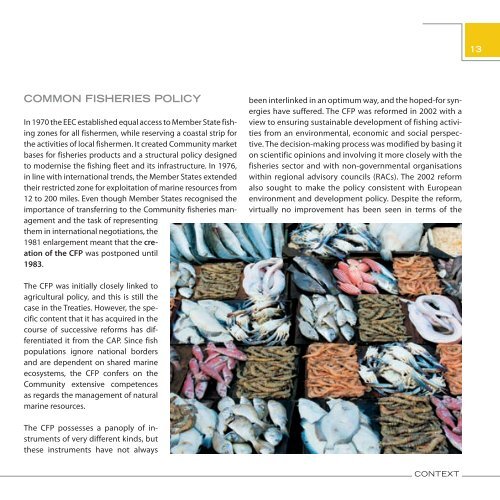language version - Europa
language version - Europa
language version - Europa
You also want an ePaper? Increase the reach of your titles
YUMPU automatically turns print PDFs into web optimized ePapers that Google loves.
COMMON FISHERIES POLICY<br />
In 1970 the EEC established equal access to Member State fishing<br />
zones for all fishermen, while reserving a coastal strip for<br />
the activities of local fishermen. It created Community market<br />
bases for fisheries products and a structural policy designed<br />
to modernise the fishing fleet and its infrastructure. In 1976,<br />
in line with international trends, the Member States extended<br />
their restricted zone for exploitation of marine resources from<br />
12 to 200 miles. Even though Member States recognised the<br />
importance of transferring to the Community fisheries management<br />
and the task of representing<br />
them in international negotiations, the<br />
1981 enlargement meant that the creation<br />
of the CFP was postponed until<br />
1983.<br />
The CFP was initially closely linked to<br />
agricultural policy, and this is still the<br />
case in the Treaties. However, the specific<br />
content that it has acquired in the<br />
course of successive reforms has differentiated<br />
it from the CAP. Since fish<br />
populations ignore national borders<br />
and are dependent on shared marine<br />
ecosystems, the CFP confers on the<br />
Community extensive competences<br />
as regards the management of natural<br />
marine resources.<br />
The CFP possesses a panoply of instruments<br />
of very different kinds, but<br />
these instruments have not always<br />
been interlinked in an optimum way, and the hoped-for synergies<br />
have suffered. The CFP was reformed in 2002 with a<br />
view to ensuring sustainable development of fishing activities<br />
from an environmental, economic and social perspective.<br />
The decision-making process was modified by basing it<br />
on scientific opinions and involving it more closely with the<br />
fisheries sector and with non-governmental organisations<br />
within regional advisory councils (RACs). The 2002 reform<br />
also sought to make the policy consistent with European<br />
environment and development policy. Despite the reform,<br />
virtually no improvement has been seen in terms of the<br />
CONTEXT<br />
13

















